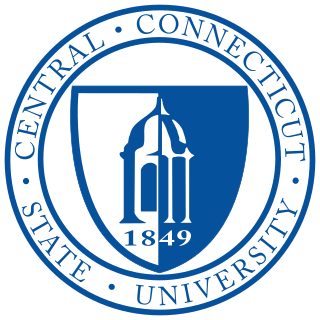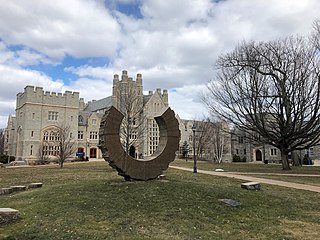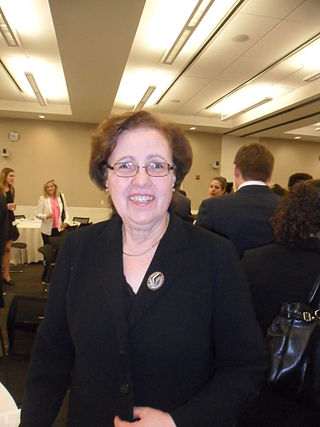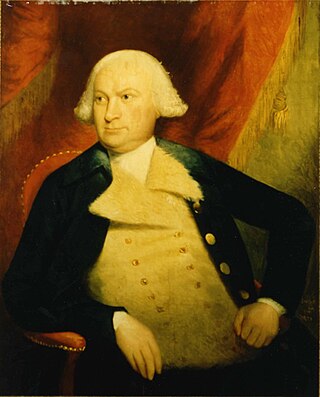
Carmen E. Espinosa is a former justice of the Connecticut Supreme Court. [1] She became a senior justice on July 16, 2017. [2]

Carmen E. Espinosa is a former justice of the Connecticut Supreme Court. [1] She became a senior justice on July 16, 2017. [2]
Espinosa received a Juris Doctor from The George Washington University Law School; a Master of Arts in Hispanic Studies from Brown University and a Bachelor of Science in secondary education with a major in Spanish and French from Central Connecticut State University. [3]

Central Connecticut State University is a public university in New Britain, Connecticut. Founded in 1849 as the State Normal School, CCSU is Connecticut's oldest publicly-funded university. It is made up of four schools: the Ammon College of Liberal Arts and Social Sciences; the School of Business; the School of Education and Professional Studies; and the School of Engineering, Science, and Technology. As of Spring 2022, the university was attended by 8,898 students: 7,054 undergraduate students and 1,844 graduate students. More than half of students live off campus and 96 percent are Connecticut residents. The school is part of the Connecticut State Colleges & Universities system (CSCU), which also oversees Eastern, Western, and Southern Connecticut State Universities.

Benjamin Nathan Cardozo was an American lawyer and jurist who served on the New York Court of Appeals from 1914 to 1932 and as an Associate Justice of the Supreme Court of the United States from 1932 until his death in 1938. Cardozo is remembered for his significant influence on the development of American common law in the 20th century, in addition to his philosophy and vivid prose style.

The University of Connecticut School of Law is the law school associated with the University of Connecticut and located in Hartford, Connecticut. It is the only public law school in Connecticut and one of only four in New England. In 2020 it enrolled 488 JD students.

The Connecticut Supreme Court, formerly known as the Connecticut Supreme Court of Errors, is the highest court in the U.S. state of Connecticut. It consists of a Chief Justice and six Associate Justices. The seven justices sit in Hartford, across the street from the Connecticut State Capitol. The court generally holds eight sessions of two to three weeks per year, with one session each September through November and January through May. Justices are appointed by the governor and then approved by the Connecticut General Assembly.

Hernandez v. Texas, 347 U.S. 475 (1954), was a landmark case, "the first and only Mexican-American civil-rights case heard and decided by the United States Supreme Court during the post-World War II period." In a unanimous ruling, the court held that Mexican Americans and all other nationality groups in the United States have equal protection under the 14th Amendment of the U.S. Constitution. The ruling was written by Chief Justice Earl Warren. This was the first case in which Mexican-American lawyers had appeared before the Supreme Court.

Sonia Maria Sotomayor is an American lawyer and jurist who serves as an associate justice of the Supreme Court of the United States. She was nominated by President Barack Obama on May 26, 2009, and has served since August 8, 2009. She is the third woman, first woman of color, the first Hispanic, and first Latina to serve on the Supreme Court.

The demographics of the Supreme Court of the United States encompass the gender, ethnicity, and religious, geographic, and economic backgrounds of the 116 people who have been appointed and confirmed as justices to the Supreme Court. Some of these characteristics have been raised as an issue since the court was established in 1789. For its first 180 years, justices were almost always white male Protestants of Anglo or Northwestern European descent.

Carmen Beauchamp Ciparick is a judge who served as associate judge on the New York Court of Appeals, the highest court in the state of New York, from 1994 through 2012, when she reached mandatory retirement age. As of June 2015, she has returned to the practice of law.

Andrew J. McDonald is an American judge and former politician from Connecticut. He serves as an associate justice of the Connecticut Supreme Court.

Mari Carmen Aponte is an American attorney and diplomat who has served as the United States Ambassador to Panama in the Biden administration since November 2022. She previously served as acting assistant secretary of state for Western Hemisphere affairs on May 5, 2016. She also served as U.S. ambassador to El Salvador from August 2010 until December 2011 and again from June 14, 2012, until December 2015. Before that she was serving as a member of the board of directors of Oriental Group, a major financial and banking services enterprise in Puerto Rico. President Obama also nominated her as the United States' permanent representative to the Organization of American States, but the Senate had not acted upon that nomination upon adjournment in December 2014.

Oliver Ellsworth was a Founding Father of the United States, attorney, jurist, politician, and diplomat. Ellsworth was a framer of the United States Constitution, United States senator from Connecticut, and the third chief justice of the United States. Additionally, he received 11 electoral votes in the 1796 presidential election.
Marianne Espinosa, formerly known as Marianne Espinosa Murphy, is a Judge of the Appellate Division of New Jersey Superior Court, and the subject of a political controversy in New Jersey in 1993. She is the ex-wife of Michael Murphy, a former county prosecutor and unsuccessful gubernatorial candidate in New Jersey.

Cardona v. Shinseki was an appeal brought in the United States Court of Appeals for Veterans Claims (CAVC) of a decision by the Board of Veterans' Appeals upholding the denial of service-connected disability benefits for the dependent wife of a female veteran. The United States Department of Veterans Affairs denied the disability benefits based on the definition of "spouse" as "a person of the opposite sex" under federal statute. On March 11, 2014, the CAVC dismissed the case as moot after the Secretary of Veterans Affairs advised the Court that he would neither defend nor enforce the federal statute. Cardona subsequently received full payment of her spousal benefits, retroactive to her date of application.

Carmen R. Velasquez is a Supreme Court Justice serving in the 11th district of the State of New York since January 2015. She has also served as judge for the New York City Civil Court of Queens County previously to her election. Velasquez is the first Ecuadorian to serve as judge for the Civil Court and Supreme Court of the State of New York.

Richard A. Robinson is an American lawyer and judge, who has served as chief justice of the Connecticut Supreme Court since 2018, and previously as an associate justice from 2013 to 2018.
Christine Elyse Keller is an American lawyer and judge from Connecticut. She is a Senior Justice of the Connecticut Supreme Court.